With 67 percent of people fully immunized (and 78 percent having taken at least one dose of coronavirus vaccine), South America is by some margin the world’s leader in getting jabs in arms — despite a slow start to its rollout last year. Much of this has been down to public eagerness, as the region has a generally high trust in vaccines. However, some anti-vax pockets remain.
In Brazil, President Jair Bolsonaro has sought to repackage typical American culture wars, reinforcing individual freedoms and the right to choose not to vaccinate. But in neighboring Bolivia, resistance to immunization is a much more complex issue.
In a push to advance the immunization campaign, the government imposed vaccine mandates to enter public buildings. At first, demand for jabs skyrocketed — but protests from anti-vax groups also increased, with violent protests erupting in the El Alto and Cochabamba regions. Tensions...


 Search
Search






































